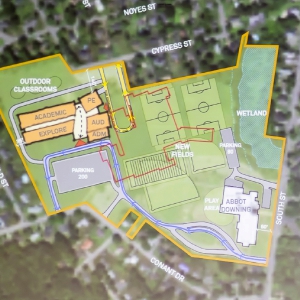Opinion: Fiscal autonomy is good for Concord public schools

“Fiscal autonomy enables the board to effectively and efficiently operate one of the largest school districts in the state,” writes Ardinger. Monitor file
| Published: 04-08-2024 6:00 AM |
Kassandra Ardinger is a former chair of the Concord School Board. She’s lived in Concord for 35 years, and her three children went to Concord public schools. She currently serves as a member of the University System of New Hampshire Board of Trustees.
The decision by the Concord School Board to build a new middle school at the Broken Ground site has angered a segment of the Concord community. This sentiment now threatens the very aspect of school district governance which has benefitted the citizens of the Concord School District since 1961: the board’s fiscal autonomy.
Despite the discord being fomented by the group Concerned Citizens of Concord, limiting the fiscal authority of the Concord School Board would result in a governance structure that is less nimble, more bureaucratic, more cumbersome, and vulnerable to the volatile and unpredictable storms of a very divided electorate.
Under the charter, last revised and adopted in November 2022 by Concord voters, we elect school board members to make decisions about our public schools. As such, voters have an immediate and direct impact on how the schools in Concord operate. With one-third of the board seats up for election each year, members of the public have the opportunity to significantly influence the decision-making by electing those individuals who most closely align with their beliefs.
The board’s jobs are to preside over an annual budget of over $100 million, oversee almost 1,100 employees, create and revise hundreds of school policies, negotiate with nine bargaining units, maintain over one million square feet of facilities on 177 acres, and do all of that while keeping the best interests of Concord students and taxpayers in mind.
Fiscal autonomy enables the board to effectively and efficiently operate one of the largest school districts in the state. Concord has a well-regarded school district and is a highly desirable place to work, live and raise children, in large part because the board is elected solely for the purpose of meeting the needs of students, while simultaneously balancing those needs with the ability of Concord taxpayers to fund them.
In a city with a population of just under 45,000, it is simply not realistic to expect that voters will muster the individual resources of time and expertise to effectively evaluate the issues involved in running a $100 million school district. It is even less likely that the also locally-elected citizens on the city council, charged with overseeing the management of our city government and the myriad budget needs of the various city departments, would be better equipped than the nine elected members of the school board to evaluate education needs. The complex needs of a large school district are best scrutinized, analyzed and discussed by a group whose very purpose is dedicated to the values of the education enterprise.
Representative government is about electing citizens who have the responsibility to make decisions. If the majority of the electorate disagrees with the decisions elected officials make, the opportunity exists at the next election to vote them out. Expressing frustration about the middle school vote by attempting to take away fiscal autonomy is shortsighted and will undermine the high quality of education in the capital city.
Article continues after...
Yesterday's Most Read Articles
 Hometown Heroes: Couple’s sunflower fields in Concord reconnects the community to farming
Hometown Heroes: Couple’s sunflower fields in Concord reconnects the community to farming
 Boscawen resident takes issue with proposed town flag designs
Boscawen resident takes issue with proposed town flag designs
 Skepticism turns to enthusiasm: Concord Police welcome new social worker
Skepticism turns to enthusiasm: Concord Police welcome new social worker
 With new plan for multi-language learners, Concord School District shifts support for New American students
With new plan for multi-language learners, Concord School District shifts support for New American students
 With Concord down to one movie theater, is there a future to cinema-going?
With Concord down to one movie theater, is there a future to cinema-going?
 Opinion: The Concord School Board can restore trust with residents
Opinion: The Concord School Board can restore trust with residents
One only needs to look to headlines about drastic teacher cuts and increased class sizes in places like Pembroke and Manchester to imagine how such a radical change in our long-standing form of school governance would play out. Respectful communications between elected officials and the electorate, and not threats of charter revision, are the key to any successful building plan.


 Opinion: No, Republicans are not better on the economy
Opinion: No, Republicans are not better on the economy Opinion: Campus chaos and America’s character
Opinion: Campus chaos and America’s character Opinion: Learning from landscapes
Opinion: Learning from landscapes Opinion: Summer camp registration: The only thing higher than the price is the anxiety
Opinion: Summer camp registration: The only thing higher than the price is the anxiety
